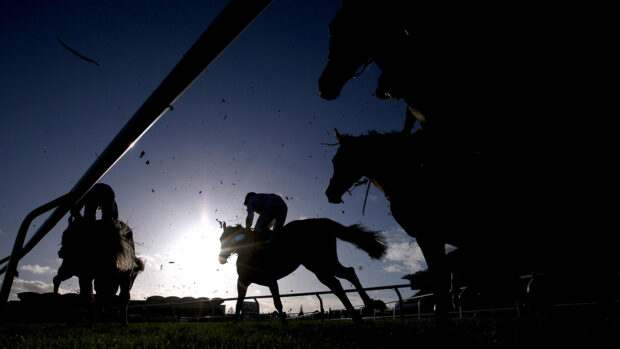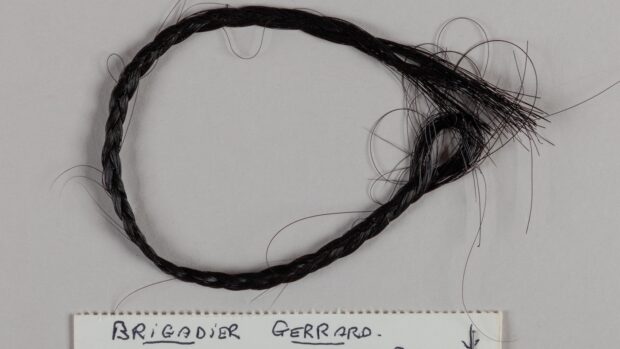
It is in the concise terminology of the Daily Racing Form, the American equivalent of the Racing Post, that Man OWars story is best told:
Won easily; second and third driving
Won easily; second and third driving
Won easily; second and third driving
Over and over again, in identical sentences, Man OWars impact on the racing world is recorded.
His success does not have the loveable underdog element of Seabiscuits, nor the overriding drama of Ruffians. Man OWars story is simply dominance.
This was a horse who won 20 times in 21 races. He beat rivals his own age. He beat older horses. He won sprints and he won at distance. He won in rain, mud, heat and cold. His feet were as hard as stone and his constitution like iron. He won on a gruelling schedule, his races spread over just two seasons and sometimes only days apart. He won carrying the heaviest weights ever heard of.
Man OWar beat the top horses of his era and when there were no horses left for him to beat, he beat the clock. He broke eight records, nearly all of them in races ridden under restraint and conceding weight. In fact, he smashed records he took 6sec off the track record for 1¼ miles at Kenilworth Park. He set a new American record at 1m 5f, beating Hoodwink by 100 lengths. His American record time in the Belmont Stakes at 1m 3f stood for decades.
Man OWar was odds-on in all his races. On three separate occasions, bookmakers quoted him at an astronomical 1-100.
The horse by which all other American Thoroughbreds are measured was foaled in New York on 29 March 1917, at the Nursery Stud, owned by August Belmont II. Man OWars sire was the great Fair Play. His dam was Mahubah, daughter of the English champion Rock Sand, who was the winner of the Epsom Derby, the 2000 Guineas, and the St Leger. Belmont paid a headline-making $125,000 for Rock Sand in 1906. His father was the first president of the American Jockey Club.
Mahubas foal was born a big, bright chestnut. His coat developed such a fiery sheen that he was never called anything but Red or Big Red around the stables.
Because of his involvement in World War I, Belmont decided to sell that years crop of yearlings. Named by Belmonts wife, Man OWar was bought at the Saratoga sale for the modest sum of $5,000 by Samuel D Riddle of Philadelphia. Riddle was new to racing but was an avid show jumper and hunter, and a master of Foxhounds.
It quickly became apparent to Riddles trainer, Louis Feustel, that Man OWar would be a tough horse to break. One of Feustels stable boys once said of the colt: Dont ever try to force him or youll come out second best every time. Ask him and hell do what you want, push him and its all off.
His first racing season quickly showed Man OWar to be in a league of his own. He won every race convincingly, except the infamous Sanford Memorial Stakes at Saratoga. After an assistant starter sent the field off with Man OWar facing away from the barrier, jockey Johnny Loftus got the colt hopelessly boxed in and finished second to the appropriately named Upset.
Even Upsets jockey, Bill Knapp, came to regret the marring of the great horses record, saying: If Id moved over just an eyelash that day at Saratoga hed have beat me from here to Jaloppy. Sometimes Im sorry I didnt do it!
In case there was any doubt, Man OWar whipped Upset on the other six occasions they met.
By the second race of his three-year-old season, Man OWar was running against only two other horses. In the following two races, he faced just one rival. Man OWar was too good he was driving every other horse from the track.
At the Dwyer Stakes that year, however, he raced the only horse that ever gave him a moments challenge. John P Grier stuck so closely to Man OWar in the early moments of the race that from the grandstands he was completely hidden by the bigger horses body. Then for one thrilling moment, his muzzle crept out in front of Man OWars. But the big red colt levelled out and pulled away, crossing the finish a length and a half in front. He had actually been forced to finish driving. It wouldnt happen again.
For the Potomac Cup, Man OWar was assigned the heaviest weight ever carried by a three-year-old 9st 12lb, 24lb more than the next horse. He won, and set a new track record.
Riddle asked the Jockey Club handicapper what to expect if Man OWar raced as a four-year-old. He was told: If he wins his first race, Ill put the heaviest weight on him ever carried by a Thoroughbred.
Riddle felt his horse had given enough. After his next race, in which he trounced the first ever Triple Crown Winner, Sir Barton, Man OWar was retired to stud. He went on to sire many stakes winners, including the great champion War Admiral, Seabiscuits archrival. He died on 1 November 1947, aged 30, reportedly the oldest Thoroughbred on record at the time.
One of the few criticisms of this legendary horse is that he never truly had to fight for his wins. Only in that one race against John P Grier was he even put under pressure. So we will never know what his limits might have been.
We do not know to this day how fast Man OWar was, as we were afraid to let him out; knowing his intense speed, we feared he might harm himself, said Riddle.
We never lifted a jockey to his back we didnt tell to hold the horse down, so as not to win by too wide a margin.
The story goes that when he was offered the incredible sum of $1m for Big Red, Riddle replied: There are many men who are millionaires, but only one who owns Man OWar.
It would be another 35 years before any Thoroughbred would be sold for that amount of money.
|
||
 |
||


 Get up to 19 issues FREE
Get up to 19 issues FREE TO SUBSCRIBE
TO SUBSCRIBE 



